If you are serious about building and maintaining your audience, a lot of your time will be taken up with recording and editing processes, especially if audio quality is a priority to you.
Alitu simplifies the whole process through a web-based application. You save time and worry by recording your audio easily and automating the editing process.
Throughout this article, I will discuss what Alitu is, how it works, and what are its benefits and limitations. As well as answering common questions, I will compare it to other similar apps, tools, and software and ultimately help you decide whether it's right for you.
Alitu is a friendly Podcast Maker online application. It is intended to make editing and production as simple as possible by automating the majority of the process and providing podcast-specific tools for the remaining. Developed by the team at The Podcast Host , it was purpose-built for Podcasters.
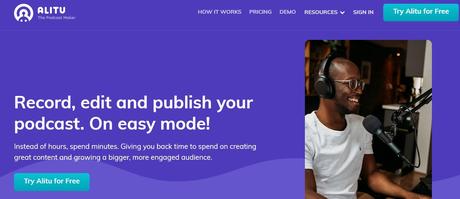
It may be a web-based application that converts your raw recordings into a massive, audience-growing show.
Once the raw audio is uploaded by podcasters, it offers:- Noise reduction, normalization, and automatic cleanup
- You can add your music at the beginning, end, and even within the episode files
- To remove mistakes from your podcasts, use a podcast-specific editing tool
- Easily add fades, transitions, ads, fx, and teaser clips
- Add background music to voice clips
- Solo and call recording
- Merge interview files into one file
- Split recordings
- Develop segments or themes that are accompanied by music
- Your podcast hosting platform should allow you to publish
- Alitu Hosting beta
Using Alitu To Create Podcasts Is Fast And Easy
The platform offers two main options for adding files:
- Audio from your podcast can be recorded directly into Alitu (either alone or with guests).
- Upload audio files for pre-recorded podcasts
In addition to removing unwanted background noise and standardizing volume, Alitu automatically cleans the audio after it has been uploaded.
Pro tip: Alitu also enables you to upload multiple pre-recorded files that can then be merged.
If, for example, you want to record an interview on Zoom, this would be useful. Zoom will record separate audio files after you finish recording and have downloaded the audio (as long as you have enabled 'Record a separate audio file for each participant in your settings).
You will receive one file and your interview guest will receive another. By uploading the files to Alitu, you can have the app link them together directly for you.
Afterward, Alitu will clean up your audio and you can make further edits like removing 'erms', long pauses, or coughing and you can add music or audio clips (eg for your intro and outro) either from your own collection or from Alitu's Free Music Library.
Yes, as previously stated, Alitu may be used to record podcast audio. Directly within the site, you can record a solo episode or an interview with a guest and edit the audio.
Recording straight on the platform eliminates the additional steps required when recording audio elsewhere (using another program), such as saving and downloading the file before transferring it to Alitu for editing. Alitu eliminates the requirement for additional (and perhaps expensive) recording software.
Use Alitu's Record Call function to record an interview with a visitor. This feature allows you to invite your guest into a call room (akin to Zoom, Zencastr, or Skype) and then record the chat.
This greatly streamlines the workflow, as you and your guest may perform all actions within Alitu.
Alitu simplifies the entire procedure because everything can be completed in a single location. No additional recording instruments or software are required.
How Do You Record And Edit Your Podcast With Alitu?
As previously said, Alitu's primary benefit is its simplicity, which eliminates the time-consuming task of editing an episode's audio. Here is a detailed instruction (with screenshots) on how to use Alitu to prepare your podcast episode.
The initial step is to create that episode! After logging into your account, you simply need to click the plus sign next to My Episodes.
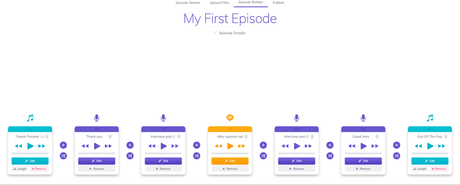
2. Input your episode details -
There needs to be an author, a title, and an episode number for every episode. These are the first things you need to input. It is optional to add an episode description. If you aren't 100% certain about something, you can change or add it later.
3. Upload your file(s) / record your audio -
Then you can upload your actual audio files. You can drag and drop these audio files (video files are also accepted) to Alitu if you've already recorded them.
- Solo Podcast Recording - You can record your episode right inside Alitu. The 'Record' option can be found in the Library, in the Episode Builder, in the Music Editor, or even during episode creation.
- Interviews - Select the Call Recorder option instead of the interview recorder if you wish to record an interview with a guest. Alitu sorts out audio levels and cleans up your recordings after you upload/record them.
4. With the Episode Builder, you can sequence your episodes
Now that you have uploaded your podcast episode, you can play around with the order of the files within the Episode Builder.
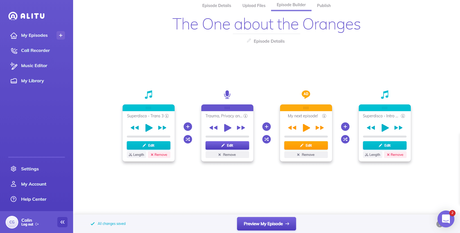
The following features are available in Episode Builder:
- Reorder your audio clips by dragging and dropping
- By clicking the Plus icon, you can add audio files between sections
- By clicking the Shuffle icon, you can fade audio sections in and out and set transition time.
Alitu allows you to add default music for intros and outros, meaning that whenever you create a new episode, it will automatically add these.
I think this is a great feature because it streamlines your entire output process, with no hunting for files. This feature becomes a simple set and forgets the sequence to immediately cut down on production time.
You can edit the waveform displayed for any of the separate audio files by clicking Edit. Since everyone makes mistakes (umms, ahhs, or coughs) when recording, you can remove parts of the audio that have no place in the final version.
5. Publish directly to your podcast hosting platform
Once you've finished editing your podcast episode and sequence, you can simply export with the click of a button.
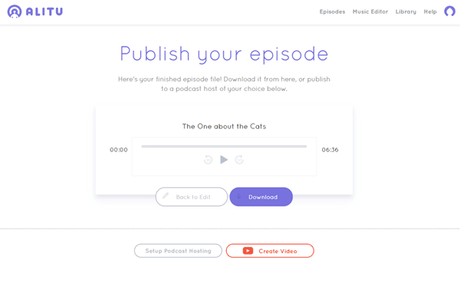
The final audio version of your podcast episode can be heard at this stage, and the episode can be published directly to your podcast host. Alitu seamlessly integrates with the seven most popular podcast hosting platforms, including:
Alternatively, if your podcast host isn't listed, you can export your audio and upload it manually. Worth noting is that Alitu is soon to release its own hosting solution, so future podcasters will have an all-in-one podcast solution which will help save a bit of money and time in the long term.
While exporting, you can also make an audiogram-style video for your episode, complete with a moving soundwave. Audiograms can be uploaded to YouTube or shared on social media since they are essentially moving sound waves. This is a simple method for creating mp4s from audio content.
Are you going to use Alitu? That depends on your circumstances.
What if you were a podcaster who:- Recording and editing are not her strong suits
- Does not know how to use more advanced editing software
- Is interested in saving time
- Is trying to make things easier and more efficient
Alitu is an incredibly useful tool. The interface is friendly and simple and everything is automated.
If, however, you've been recording and editing audio for years, already use advanced software, and have a lot of experience in making your podcast sound great, Alitu is probably not for you.
Alitu focuses on automating technical aspects of audio production, so at the moment you do not have the option to make more advanced adjustments yourself.
When paid annually, Alitu costs $32/month, or $320/year (that's £24/month or £240/year). A discount is offered when paying annually, which works out to just under $27/month.
A free trial is included with both monthly and annual plans.
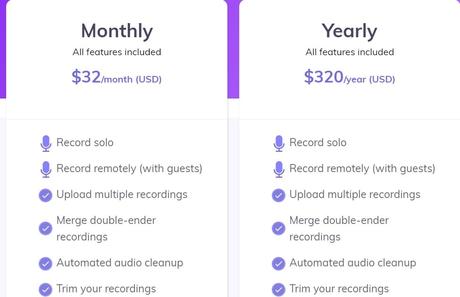
There's no comparison between that and Descript's pro plan, which is $24/month, and Adobe Audition, which is $31.49/month.
Comparing tools shouldn't just be based on price, as each tool's features and offerings vary, and Alitu is all about saving time and automating processes.
Here are the benefits of alitu:
1. Podcast Automation - through recording, editing, and productionWith automation, virtually everything is handled for you (I say virtually since you will still need to research/plan and record your podcast).
Alitu automatically improves your audio files by leveling them off and reducing any distracting background noise. As in-depth audio editing can be frightening and time-consuming for inexperienced podcasters, this feature will likely appeal to novice podcasters right away.
Alitu's user interface (UI) is self-explanatory and intuitive, so you can start working with it almost immediately after logging in. This is an additional benefit for individuals who are new to podcasting.
For this demographic, simplicity is of paramount importance, and Alitu strikes a fair balance between simplicity and a strong feature set.
3. Save moneyThe price of Logic Pro X is $199 (£174.99), and learning to use many of its functions will require a significant time commitment. While not free, Alitu is a lot cheaper and less intimidating for beginners!
With its audio leveling and noise reduction processor, you can have a great-sounding show without spending a fortune on professional-grade equipment. Result!
4. Podcast call recordingYou can record remotely with another person in Alitu, and the audio is immediately available for use in your episode. With no need for separate Digital Audio Workstations (DAWs) and phone calls, this makes long-distance interviews (or even co-hosting) a breeze.
5. Supports most audio file formatsAlitu suggests uploading.wav files for the highest quality starting point, but supports uploading in the following formats as well:
M4a,.mov,.mp3,.flac,.mp4,.wav,.mp4,.ogg,.aiff,.aif,.acc,.aac,.pcm,.wma,.alac,.mka,,.avi,.mov,.flv,.wmv,.mka,.mp4,.avi,
6. Access to Alitu's audio libraryYou can simply access and edit your files within Alitu, with a repository of your own recordings, uploads, and music - in addition to access to Alitu's music library.
7. Automatically add music intro/outrosAdd your default intros and outros to the app's Settings, and every time you create a new episode, Alitu will automatically insert them. A valuable time saver!
8. Publish straight to your podcast hosting providerYou do not need to manually export files from Alitu and then upload them to your host because Alitu connects with most podcast hosting providers.
9. 7-day free trialAs with many excellent technology firms (cough, Captivate, cough), Alitu allows you to evaluate their platform for seven days at no cost.
Here is the limitation of alitu:
1. Not freeAlitu, like most things in the world, is expensive! There are free solutions for recording and editing, such as Garageband and Audition, but they do not offer what Alitu delivers, namely automation and ease of use to get professional sound quality.
Alitu has an attractive feature set, but you must evaluate whether the increased convenience is worth the $32 monthly fee.
2. Online onlyAlitu is a web-based application, which requires an online connection for recording and editing. Not so simple, for instance, if you want to perform some editing on a train ride but your connection keeps dropping out.
3. AutomationYes, automation has both advantages and disadvantages. Alitu's automation is ideal for beginners, but it does not control bitrates, compression, file formats, editing at the highest levels, or other complex parameters.
T his will be a deal-breaker for some more experienced podcasters who desire greater control over the editing process.
4. Only set up for one inputAlitu does not support multiple microphone inputs, hence it is not possible to record with many mics at once. This would make it tough to conduct an in-person interview or co-host a show, while their Call Recording tool allows you to record numerous individuals remotely.
5. Limited editing tools compared to a DAWAlitu is excellent at what it does, but it is not designed for users who wish to modify their files in-depth.
6. Available for download only in MP3 formatIt seems reasonable that you can only export or download your completed episode as an MP3 file, as this is the only format most folders accept.
7. Can't record videoAlitu does not allow you to record video in addition to audio for your podcast, unlike Zencastr, thus if you have a video podcast, you should look elsewhere.
It does allow you to produce an audiogram, allowing you to effortlessly upload your episode to YouTube or social media.
Alternatives To Alitu
There are numerous recording and editing platforms available, and Alitu carves out a place as a platform that saves time but still produces high-quality recordings without requiring much editing knowledge.
If the price is prohibitive, you may choose to use a free alternative, such as Audacity or Garageband (only for Mac), but keep in mind that they do not have the same features as Alitu, such as automated editing.
You should consider Logic Pro or Audition if you're searching for something more advanced, given that you already have editing experience.
Let's compare Alitu to other comparable tools on the market.
1. Alitu vs Anchor
Anchor is a free, all-inclusive alternative to Alitu that provides podcast hosting, recording, editing, and monetization.
According to the adage "jack of all trades, master of none," Anchor is a prime example of this. It performs the aforementioned tasks adequately but lacks Alitu's professional recording capabilities.
2. Alitu vs Audacity
Audacity is another free choice, with a focus on recording and editing this time. You can import your files or record them directly into Audacity.
It also lets you edit your files into episodes; however, it lacks Alitu's music library, automatic leveling, background noise elimination, and call recording.
3. Alitu vs Zencastr
Zencastr focuses more on the recording aspect than the editing aspect.
Its free plan allows you to record an infinite amount of conversations with up to four participants. On their sole paid plan, which costs $20 per month, you can record individuals in 1080p video as well as audio, and you have 10 hours per month to edit audio or video.
While Alitu does not have the capacity to record or edit video, you may generate Audiograms in order to simply broadcast your show on YouTube and other social media sites.
Overall, Zencastr fits a distinct niche than Alitu and is what you need if you want to record a video podcast, but it is clearly inferior when it comes to editing.
4. Alitu vs Descript
Descript's feature set is distinct from Alitu's, offering 30 hours of transcription per month (on their Professional plan) and a user interface that enables you to alter your podcast by editing the text of the words you spoke.
If you want to correct an error, you can tweak the word and Descript will produce an artificial intelligence clone of your voice.
The monthly fee for the Professional plan is $24 dollars. Examine the feature sets and choose between Alitu's auto mastering and Descript's text-based easy editing.
5. Alitu vs Garageband
This one is rather straightforward: Garageband is free audio editing software for iOS devices. You can upload files or record them directly. It is user-friendly, although not particularly optimized for podcasting, as it is also often used for music.
It lacks the major capabilities of Alitu, such as the automation of audio leveling and background noise removal, but it is entirely free!
6. Alitu vs Logic Pro X
Logic Pro X is a comprehensive Digital Audio Workstation that permits the editing of up to one thousand tracks on a single project. There are many similarities between Logic and Garageband, and both are geared toward musicians.
It costs $200 and is completely different from Alitu, as it is designed for artists and producers. It boasts an astounding feature set, one that may be intimidating to novices.
Pros & Cons of Alitu
Pros:- Automated settings and intuitive interface.
- Theme tracks are available in variations for free in a music library.
- Recordings can be made within the app.
- This plugin integrates with popular podcast hosting services such as Buzzsprout, Captivate, etc.
- Budget-friendly
- Automation is used in editing, leaving little to no control over settings and audio quality.
- The program is limited to only one transition effect and does not have advanced features of programs like Adobe Audition, Audacity, Hindenburg Journalist, etc.
- Audio recordings are limited and available only in MP3 and mp4 formats for download.
Alitu simplifies the process of recording and editing podcast episodes. This is fantastic if you want to streamline the process of making podcast episodes and saving time - something we could all use more of, right?
Key features include automatic audio cleaning and background noise removal, solo recording, call recording for remote guests, simple episode scheduling, and direct publication to podcast hosts.
It's a terrific tool for podcasters who want to improve their audio quality but lack the ability or time to do so themselves.
If you're interested in advanced podcast editing, Alitu definitely isn't the right program for you because it doesn't offer granular control over bitrates, compression, etc. It allows podcasters to improve their audio quality at a reasonable fee, so if you're a podcaster, click here for a free trial!

